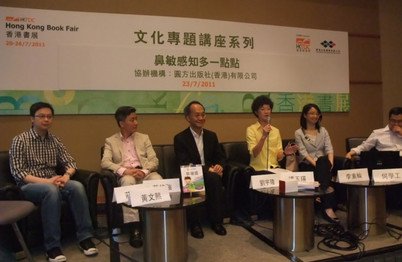Empowering Patients through Knowledge
Treating sick children requires more than the expertise of doctors and nurses. Parents and even the community need to support the children too by minimizing irritants and exposure to dangers, particularly for chronic diseases such as asthma or food allergies.
Treating sick children requires more than the expertise of doctors and nurses. Parents and even the community need to support the children too by minimizing irritants and exposure to dangers, particularly for chronic diseases such as asthma or food allergies.
The Department of Paediatrics and Adolescent Medicine understand this and in 2009 launched a book series to explain common childhood illnesses in simple terms and promote awareness. The hope was that not only parents, but other people would understand the need to advocate for children's health.
Four illustrated books have been published so far on eczema, food allergies, rheumatic diseases and, most recently, allergic rhinitis, and the Department hopes to continue publishing a new volume each year. A team of doctors worked with parents' groups to address medical and practical issues in the books, drawing on clinical and research expertise and the parents' own experiences.
Several thousand copies have been sold and plans are underway to publish the books in Taiwan and possibly Mainland China, and distribute them to Singapore.
The Head of the Department and Doris Zimmern Professor in Community Child Health, Professor Yu-Lung Lau, helped to instigate the project from a passionate belief in the power of knowledge.
"I'm really of the view that being a doctor is not just about diagnosing and treating, but that one of our most important roles is empowering our families and children to know their illness, so they will be responsible and take charge of their health. To do that they must understand the nature of the disease, when their illness is under control and when it is not, and when they need to seek help," he says.
"Some of the diseases are about lifestyle or environmental issues, so parents need to know how to control their home environment and perhaps persuade the government to make the general environment more friendly for their children's health. Perhaps they can persuade the government to have better food labeling for food allergies, and control cigarette smoke to get better air quality for children who have asthma and allergic rhinitis."
Professor Lau says such actions help to involve people in a civic society, which he sees as ultimately positive for children's health.
These ambitious goals have been matched by a commitment to involve parents in the treatment of their children and in the development of the book series. Parents have been encouraged to form associations for sharing knowledge and experiences in managing their children's health.
The Department also produced a DVD to accompany the book series, which features parents talking about such things as preparing their children for treatment and buying the right food, and demonstrates how to apply treatments like an inhaler and EpiPen.
Parent Frank Wong, who is chairman of The Hong Kong Allergy Association, says this kind of sharing and practical advice can help parents to cope. "Some parents are really nervous when they know their child has an allergy, like a food allergy, because it may be life-threatening.
"They need to hear the experience of other patients and parents so they don't have fear – to see what daily life is like, going to school, and what happens when you have an incident. When they see other parents manage the allergy for their children, or even children manage it themselves, their quality of life can improve so much. They can have hope."
Mr Wong says his association also wants to encourage changes in government policies on such things as food labeling, a goal that dovetails with Professor Lau's broader vision.
"This is about empowering people to be responsible members of a civic society that wants a scientific basis for government policy, so they not only understand their illness, but also see their mission beyond their immediate family. The hope for the future is for Hong Kong to have a responsible civic society," he says.
Professor Yu-Lung Lau and his team members, Dr Tsz-Leung Lee, Dr Hok-Kung Ho and Dr So-Lun Lee, received the Faculty Knowledge Exchange Award 2011 of the Li Ka Shing Faculty of Medicine for "A Series of Books on Important Paediatric Diseases for the Public".


